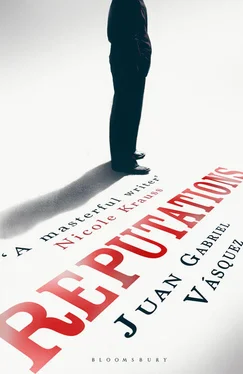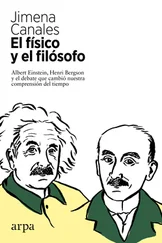‘There’s nothing to explain,’ said the editor-in-chief. He had a double chin and small eyes; among the disproportionate features of his face, the mouth seemed to move independently from the rest of his muscles. ‘Don’t fly off the handle, Javier, this happens all the time.’
‘To whom? Who does this happen to all the time?’
‘To everyone who draws cartoons here. Hadn’t you noticed? Everyone knows that sometimes things have to be cut. Now you’re going to tell me the editor doesn’t have that right.’
‘In a column,’ said Mallarino. It was a terrible defence, but he couldn’t think of another. ‘Not in a cartoon.’
‘In cartoons too, dear boy, don’t be naïve. Because they also appear in the newspaper and they also take up space. What am I supposed to say to the advertisers? Tell me, what do I tell them?’
Mallarino said nothing.
‘This is what I’m going to tell them,’ the editor went on, starting to walk in circles, both thumbs firmly stuck in his belt. ‘I’m going to tell them: Look, my good advertisers, gentlemen who pay me thousands of pesos a year, I have a problem. I can’t print your ads, in spite of the fact that the money you pay me is what pays the journalists’ wages. And do you know why, gentlemen? Because a cartoonist doesn’t like to have the space for his drawings trimmed by even a millimetre. That eventually we’ll have to close the newspaper down doesn’t matter, but the cartoon page cannot be touched. Geniuses are like that, my dear advertisers, be grateful you don’t have to deal with any. That’s what I’ll tell them: that geniuses are like that. Would that do it, Mallarino?’
Mallarino said nothing.
‘We’ll stop paying our journalists. Or if you like, we’ll stop paying you. Fair enough?’
Mallarino said nothing.
‘Look, go home and have a shot of aguardiente . And calm down: next time, someone will call young sir and ask his permission. So he won’t have a tantrum, for crying out loud, which is tiring for all of us.’ He pointed to the interior window of his office, a huge fresco of faces pretending not to look, a constellation of sidelong glances: ‘Look at these people. As if this were a market square, how embarrassing.’
And then Mallarino said his final words: ‘Would you give me back the original, please?’
He went out to find himself in a darkened city — the low clouds, the black suits of the passers-by and the metallic whisper of umbrellas opening all around — a downpour soaked him before he had time to get home. Hair plastered to his scalp and shoulders hunched under the weight of the rain, he didn’t seem to notice he’d turned into a high-plains scarecrow. Next time : the two words kept echoing in his head, ricocheting off the walls of his skull, when he recounted the whole episode to Magdalena. ‘Next time,’ she said, handing him a mauve towel as if handing him a declaration of war for his approval and signature. ‘Next time. Well, it seems to me like there isn’t going to be any next time.’
‘What do you mean?’ said Mallarino.
‘Just what you heard,’ said Magdalena. ‘We’ll tell them to go to hell, teach them a lesson.’
Magdalena was a couple of years younger than him, but she went through life like an overseer strolling around a plantation. She possessed an intelligence as brutal as her obstinacy and was not hindered by the fact that her surname was that of the founder of a legendary legal firm — two carpeted floors of a building overlooking the Parque Nacional — although she’d always declared herself in rebellion against the surname, against her father and against everyone’s expectations: instead of enrolling in the Faculty of Law to carry on the family tradition, Magdalena had become one of the best-paid serial actresses on national radio, the voice that, from Kalimán the Incredible first and then Arandú, Jungle Prince , held the whole country spellbound at twelve noon. Those melodramas had been a natural step for her, a prolongation of the advertisements she’d read since adolescence, when publicity firms began vying for the privilege of hiring her voice. Magdalena’s voice: husky and smooth at the same time, one of those voices that paralyse the hand of someone about to turn a dial, that translate the chaos of the world and convert its obscure jargon into a diaphanous tongue. ‘A cello that speaks,’ Mallarino called her, and now that voice was saying: We’ll tell them to go to hell , and Mallarino was thinking: Yes, to hell , and he was also thinking: Teach them a lesson . The most difficult times, in Mallarino’s experience, were reduced to their simplest expression when Magdalena spoke of them, and that’s what happened that afternoon: after the conversation, after the hot shower Mallarino took to warm up after getting chilled by the rain, after the improvised sex and the well-planned meal, everything was clear.
Magdalena took the plates and cutlery and coloured sisal place mats into the kitchen while Mallarino brought a piece of paper, a quill pen and a bottle of ink to the table, still warm from the heat of the serving dishes. In twenty minutes, while she put away the leftovers and covered the containers with a meticulous sheet of tinfoil, he quickly drew a self-portrait and put it in the envelope with the drawing of the presidents. He amused himself caricaturing himself for the first time: the premature baldness, the bushy black beard he’d inherited from his father and the thick angular glasses, two little boxes of black acetate that did not manage to hide his wary eyes, his studiedly helpless gaze. Where his mouth would be, a gag straight out of the movies; beneath the drawing, the caption. The oligarchy doesn’t like to be talked about , ran the first line. And then: They wouldn’t want us noticing that they’re still right there . In the envelope there was another document: a handwritten letter to Pedro León Valencia. He was the editor-in-chief of El Independiente , the oldest Liberal newspaper in the country, and a man of strong convictions. ‘I’d like to offer you a package,’ wrote Mallarino in his own diploma writer’s calligraphy, but with words dictated by Magdalena. ‘I’m sending one original cartoon, one censored cartoon and one cartoon on censorship. If you can publish them all together, the package is yours; if not, return it and I’ll look for another paper.’ Magdalena insisted on delivering the envelope, so Mallarino wouldn’t appear needy (she never lost sight of these strategies of life in society), and that very evening both the telephones in their house began to ring in a hysterical chorus. It was the editor of the opinion page, a man Mallarino knew and had never liked: he was one of those professional victims incapable of delivering good news without disguising his envy. And Mallarino knew he was phoning to give him good news: he could sense it in the hostility of his tone, in his words with syllables cut off as if with a machete; Mallarino was surprised his rancour didn’t make the receiver splutter.
‘The boss wants to offer you a permanent position,’ said the little man.
‘But I don’t want that,’ said Mallarino. ‘I don’t want to be on anyone’s staff.’
‘Don’t be silly, Mallarino. A staff position is what every cartoonist dreams of. A guaranteed salary, maybe you don’t get it.’
‘I get it,’ said Mallarino. ‘But I don’t want it. Pay me the same, but without being on the staff. I promise I won’t draw for anyone else. And you people promise you’ll publish what I send even if it’s sometimes against your friends. Go ask your boss, and tell me.’
It was a risky move, but it worked: the three drawings appeared the next day, and so, temporarily disguised as a comic strip, calling the reader so eloquently from the centre spread, no longer the mere protest of a young man who fancied himself an artist, they became an elaborate narrative of media betrayal, a condemnation of censorship and a noisy mocking of bourgeois vulnerability, all done by one of that bourgeoisie’s most representative sons. ‘Your husband’s gone mad,’ Magdalena’s father told her. ‘Or maybe he’s turned into a communist and nobody’s noticed yet.’ She passed on the message to Mallarino raising her left eyebrow and with a slightly crooked smile, a sign of evident satisfaction that there, in the semi-darkness of their room, at the end of a day full of tensions and worries, was almost erotic. Mallarino turned on the radio, to see if he could find a repeat broadcast of the day’s episode of Kalimán , but Magdalena, who detested hearing herself, covered her ears with histrionic gestures, and he found himself forced to look for something else. Magdalena found it impossible to recognize herself in the actual broadcast: that voice that wasn’t her voice, she said, rather there was a national conspiracy to wait for her to leave the studio and then rerecord, with another, better-trained actress, everything she had recorded. Mallarino held his arm out and Magdalena leant her head on his chest, put her arms around him and let out a couple of cat-like noises that he didn’t manage to understand. After a few seconds of silence, Mallarino noticed that Magdalena’s body changed weight — her forearm and her elbow, her clean-smelling head — and knew she’d fallen asleep. He found a football match on the radio, and before falling asleep as well, lulled by his wife’s quiet snores and the monotonous commentaries from the reporters, he heard Apolinar Paniagua score twice for Millonarios and thought of something completely unrelated to those goals, but to do with the drawing in El Independiente : he thought that he couldn’t prove it, that he couldn’t have said how or why, but his place in the world had just changed irrevocably.
Читать дальше












